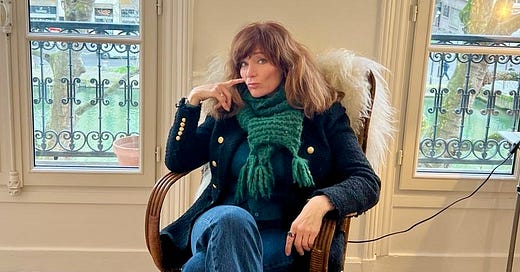Well hello! I hope you enjoy this new series from Paris. You can read last week’s edition here: “On Leaving Brooklyn For Paris.”
When I tell people I sold most of my stuff and moved to France with a dog and a few suitcases they usually say, “Wow, you’re so brave to just … go!” (This is often followed by a slight pause and an unspoken “at your age.”)
They also ask, “How’s your French?” in a whisper, like they are nervous for me. Maybe they should be. I did live here in my 20s, but I first learned French by watching dubbed reruns of “L'Incroyable Hulk.” (Simple plot, limited conjugations.)
After two months back in Paris. I’m still translating from French to English way too literally. My head feels like a loud bar full of slightly drunk strangers mishearing each other. It reminds me of the story my friend Aaron tells about meeting a woman at a party and thinking for the whole night that she told him she was a magician’s assistant, only to find out later that she was a physician’s assistant.
I like this haze of misunderstandings. Amazon sends me messages in French, like, “Your packages are preparing themselves for their expedition!” How thrilling. When you turn language upside down, it gets more interesting. Ordinary sentences become accidentally hilarious, poetic, or sexy.
I signed the contract for this apartment last Spring and the nice, floppy-haired lawyer read through it line by line in French via Zoom. At one point, he explained very seriously and carefully: “There are no small mushrooms living in your apartment. Nor do tiny beasts run through the walls.” I held up my hand for him to stop and said in English: “Hold on, hold on, are you talking about mold? And cockroaches?”
Once, when I replied quickly to someone at that law firm, I got a note that began: “Dear Madame Schrobsdorff, I thank you for your precious reactivity.” No one has ever called my reactivity precious. I thought, this country really gets me. Sure, business French has an over-the-top opulence. But it is also true that words are never just words, they reflect a way of thinking.
For example, I bought a trundle bed online from a furniture store for kids and teens, and like all shopping sites, the French company suggested other things to buy with that bed. First on the list was something called a “Bridge of Love.” Naturally, I clicked on it. The pont d’amour turned out to be a little cover that keeps people from falling into the crevice between the two trundle beds when you put them next to each other. Basically, it’s a mattress pad. But here, it seems that assumptions are made about what you’re doing with your trundles.
Even the stodgiest French bank’s communications are tinged with sometimes awkward and theoretically accidental sensuality. And it’s not just to my American ears. My friend Tala, who’s lived here for decades, says that her Banque Nationale de Paris ATM card used to give her a message in French that said: “We will give you satisfaction.” She was always tempted to respond: “Now? Right here on the street?”
You have to wonder, is all this double entendre-ing intentional? Or is this saucy language so embedded in the culture that even staid bank marketing people don’t even realize they’re doing it?
Sometimes, it’s clearly deliberate. I got an email from the electric company promoting a podcast they were sponsoring called “Climax.” The description promised that they would “attack a universal subject” in seven episodes. “Découvrez Climax,” it said. Well now! However, keep clicking, and you find out it’s a series about climate change. Did I mention this was the national electric company?
So you can see why I stared at my email in confusion when I got a message asking if I had an “affaire” with Cedric C., the handyman whom I hired via an app to assemble my new bed and dresser.
My ADD brain ran through the following scenarios with rising panic:
The app is called “Hello Neighbor” (Allo Voisins). Come to think of it that does sound suggestive. Like “Helloooo neighbor,” wink, wink, nudge, nudge. Hell, there are dating apps with names like “Hinge” or “Bumble.” Oh, no, what did I sign up for? Maybe it’s both an odd jobs site and a way to audition for a relationship via household challenges. Speed dating via IKEA assembly? That’s a fantastic idea when you think about it. Is there anything more attractive than someone who can transform a pile of flat-pack boxes into furniture without complaining or yelling?
Ridiculous, I know. But these are the kind of thoughts you have when flopping around in another culture. You can’t rule anything out. Anything’s possible, and massive misunderstandings are inevitable.
Yes, I know that affaire means “business” in French. But “affaire” can also mean a scandal, a “situation,” or “a thing.” And if you’re reading fast with an English-wired brain, how do you not wonder which meaning they intended? This is especially true if you’re in a city where trundle-bed companies make saucy assumptions and electric company emails are rife with deliberate innuendo.
I hope I don’t stop being delighted when I stop being so confused. I like thinking about how the French word for “soft” (doux) is also the word for “sweet,” and you will hear it several times a day in ways that charm the hell out of me.
If someone asks whether I want butter without salt, it’s sweet butter (buerre doux) versus salty butter (beurre salé). But people also say my dog’s fur is “doux,” as in soft, but my addled brain translates that into “buttery” via my own personal transitive law of word association. And if I run up the Metro steps at New Yorker speed, someone will tell me to slow down, saying: “doucement, doucement!” And to me, it’ll sound like: “hey, go softly, go sweetly.”
But Lord, it’s exhausting.
The other day, I was sitting in a cafe after an epic voyage to a department store to get curtains. It involved complex textile vocabulary, European standard measurements, and something about store loyalty points that I had either earned or lost or given to the person behind me in the checkout line. Who knows?
Anyway, Dog and I were sitting there taking in the periwinkle sky and, in his case, glaring at a suspicious beagle at the next table. I wanted to tell him that the French describe this hour of the day as “between dog and wolf” (entre chien et loup). I figured it would interest him, and there was no chance he’d suddenly start speaking to me in condescendingly juvenile French or English.
Then I remembered how I used to think the French said that because it was the hour in between day and night, and dogs are daytime creatures while wolves are nocturnal. And maybe the two represent sides of human nature.
But I looked it up. It turns out the expression comes from the idea that at dusk, you cannot tell the difference between a dog and a wolf. Which is not at all the same thing. I made the wrong assumption again, but because I’m entre English and French, I have the privilege of having two poetic definitions in my head.
Dog is generally uninterested in right and wrong, so I didn’t go into it with him. We just watched as the ornate old street lamps came on and a petite French garbage truck lumbered up in front of the cafe. They have flashing signs on the back that alternate the words Collecte and the word Patience. They’re telling frustrated drivers to “be patient, we’re collecting (trash). Naturally, I read it as “Collect Patience, Collect Patience.”







French Prayer:
May you go softly and sweetly,
Collecting patience,
As you cross the bridge of love
into your precious reactivity.
Not a bad summary of your post.
After having just moved to Paris
, I brought my laundry in to have it washed on July 31 and was told it wouldn’t be ready until September 1. I couldn’t understand why until they explain to me that everything shut down for the month of August when everyone takes their vacation.
And I went to a store to purchase a mattress and mistakenly asked for a “matelot”. She laughingly explained I meant a “matelas”. I had asked for a sailor!